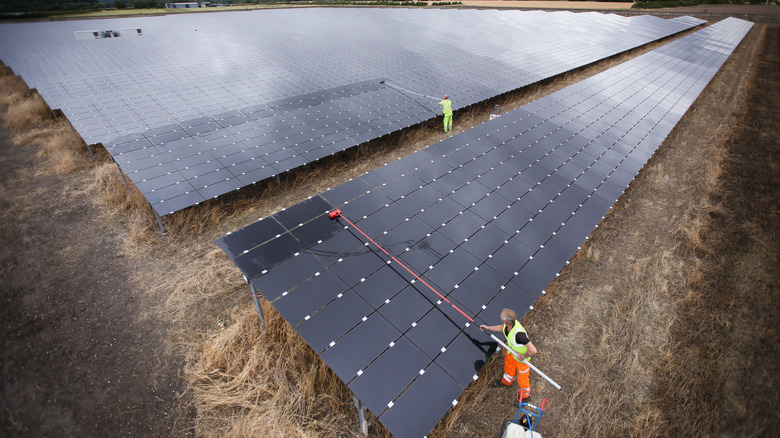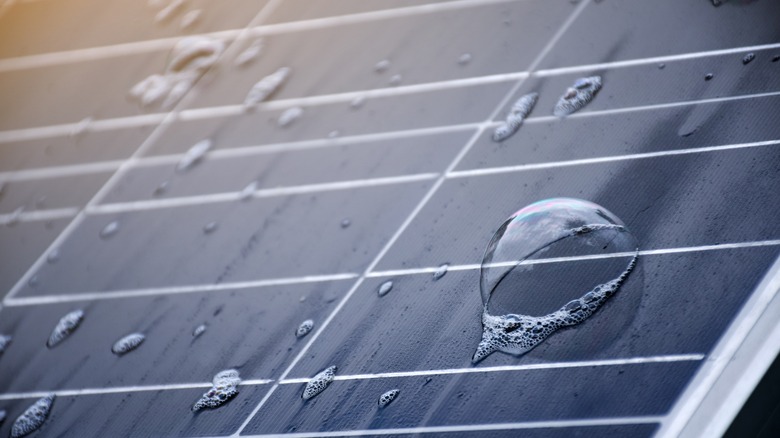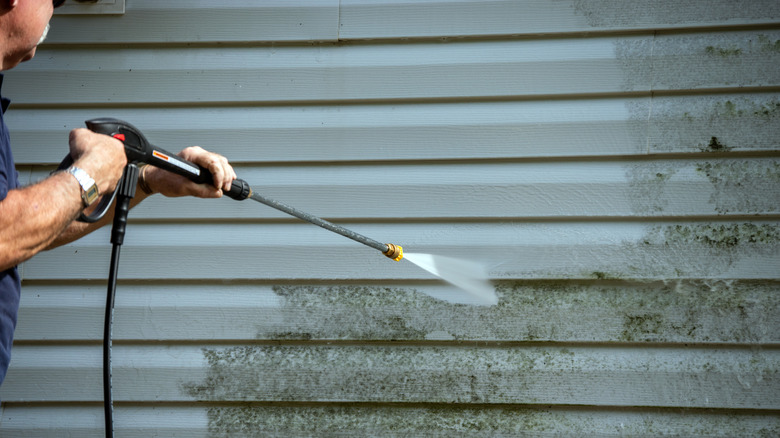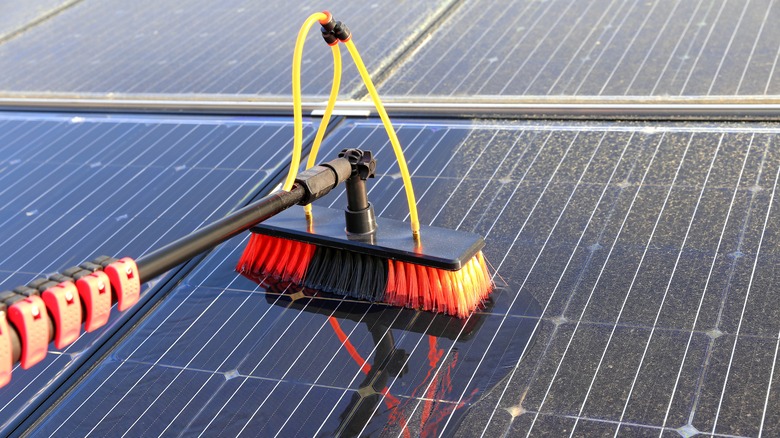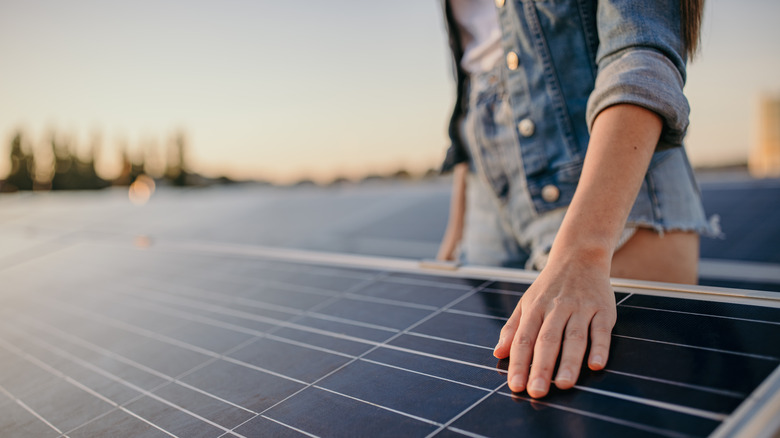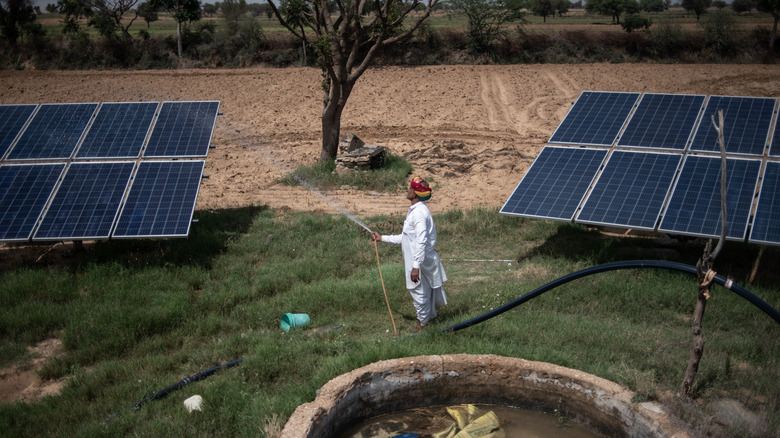Can You Use A Brush On Solar Panels? Cleaning Dos And Don'ts
We may receive a commission on purchases made from links.
One of the major appeals of having solar panels wired into your personal power system is that they do their job passively. "Set it and forget it," as the saying goes. You hook them up, they draw power from the sun during the day and supplement your power needs. They might not power your entire home unaided, but every bit of electricity helps. It's an energy generation method that requires far less direct user intervention than, say, shoveling coal into a furnace, gathering firewood, or running on an oversized hamster wheel.
Note how we said "far less direct user intervention" rather than "no intervention," though. This is because, although solar panels do the majority of the work on their own, they do need a little assistance from you in the form of periodic cleaning and upkeep. While solar panels are designed to be fairly resilient to the elements, they still need to have the dirt and grime cleaned off of them on a regular basis to ensure they can actually receive sunlight and generate energy. The big question, then, is how are you supposed to perform this cleaning? Can you use a simple brush for the job? The broad answer to that question is yes, but it's wise to understand the cleaning process in more depth than a simple yes or no.
Do: Rinse with a light misting and gentle cleaners
If loose dirt, sand, or sediment has started to accumulate in the grooves and nooks of your solar panels, it can gradually begin to impact their ability to function. Solar panels can't receive sunlight very well if a layer of crud covers their reflective surfaces.
Since solar panels are sheer surfaces, a good spray of water can loosen most surface-level contaminants. However, make sure that your solar panels are shut off and disconnected from the grid. Furthermore, it's important to give the panels time to cool down so that you don't induce a temperature shock when you spray them. Once they're ready, get out a garden hose, attach an adjustable sprayer, and give the surface of the panels a gentle misting. Take it slow and steady, making sure to get some water on as much of the panels' surface area as possible.
After this, you can use a separate device, like a gallon sprayer, to apply a cleaning solution to the panels. This will help to dissolve and loosen some of the more stubborn contaminants. The best thing to use here is a professional-grade solar panel cleaning solution, which you can find on Amazon for around $25. If you can't find a pre-made solution, you can make your own by filling a bucket with water and dissolving a bar of mild hand soap in it. Don't use any intense, abrasive chemicals, as they could cause the panels to fray and erode.
Don't: Use a power washer
When it comes to cleaning outdoor surfaces caked in dirt and grime, your first inclination might be to bust out the ol' power washer and blast the contaminants away. If we were talking about the side of your house, that would be one thing, but when it comes to solar panels, power washers are best kept in the garage and out of the way.
The powerful bursts of water that shoot out of a power washer might force out dirt and sediment, but it's too concentrated a strength for the reflective surfaces of the panel. It risks scratching, cracking, or generally wearing down the components. Not only that, but such intense pressure has a chance of piercing through the sealed edges of the panel, into the sensitive electronics beneath. Assuming you don't break something important outright, the water could seep into the electronics and cause irreparable damage to the panel's systems. It won't matter how clean you get your solar panels if the parts responsible for generating electricity are completely fried.
Do: Use a soft-bristled brush
Even after you've sprayed the surfaces of your solar panels with water and a cleaning solution, there might still be some stubborn bits of dirt or sediment gunking up the nooks and crannies. To remove the accumulated particulates, you can use a simple brush.
When picking a brush for solar panel upkeep, make sure you grab one with soft, gentle bristles. Using a brush with thick, pointy bristles could scratch and damage the sensitive surfaces of your solar panels as you scrub. The same kind of brush that you use to clean windows on your home or car should work here. If at all possible, try to get a brush with a built-in water-fed system. This will help to make the job a bit easier, with both the spraying and brushing steps together.
If you can't find a sufficiently soft brush, a car-cleaning sponge or squeegee will also work. Just make sure that it's a professional-grade tool, again made with soft materials. Generic squeegees with thick, rigid cleaning blades or scouring kitchen sponges won't work.
Don't: Scrub with excessive force or step on panels
If your solar panels have been subjected to a particularly harsh burst of weather, such as a wind storm or blizzard, there might still be some sediment left there even after you've gone through a full bout of cleaning. It's frustrating to be sure, but don't take your anger out on the panel!
If you need to engage in more concentrated cleaning to get rid of a stubborn spot, don't try to scrub vigorously even with a soft-bristled brush. Too much force will damage the panel, no matter how soft your tools are. Just keep applying the same water, solution, and gentle scrubbing method you already have, albeit on a smaller, more focused area, and the spot should eventually fade.
On a related note, if your solar panels are mounted on the roof instead of on the ground and you've got a spot in a weird location that you can't reach, don't, under any circumstances, walk over the panel to reach it. Solar panels aren't designed to support the weight of a human, and even a slight step can crack them. Use a brush with a telescopic pole if you need to reach a distance too far for your arms, either up or down.
Do: Clean your panels on a regular basis
The most important thing you can do when it comes to solar panel upkeep is keep to a schedule of regular cleaning. While solar panels are designed to be fairly resilient and don't need to be cleaned every single day, it would be to your benefit to go through the cleaning process at regular intervals.
Generally, you should endeavor to clean your solar panels two to four times per year. If you want to be very thorough, you can clean them at the start or end of each season to remove the previous season's signature contaminants, whether that be pollen, kicked-up dust, dirty snow, or crumbly leaves. If your panels don't seem to get very dirty at all, then twice a year is fine, as the bare minimum. In this case, try to clean your panels at the end of winter and summer, since that's when most contaminants are scattered around. The appropriate timing and level of cleaning will vary depending on where you live and what kind of atmospheric conditions you regularly experience.
When cleaning your solar panels, try to get it done either in the early morning or late afternoon when the sun is partially obscured. Don't try to clean at high noon on a sunny day, as the panels will be far too hot.
